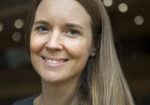Hösten 2021 blev jag klar med ett ovanligt projekt. Då utkom min reportagebok Ur döden liv på förlaget Natur & Kultur. Den kan köpas till exempel här och här.
Böcker har jag skrivit förut – men de har varit läroböcker. Läroböcker skriver jag eftersom jag är övertygad om att naturvetenskap är helt central för vår förståelse av världen, och för att jag tror att barn och unga under rätt ledning skulle kunna känna på ett helt annat sätt än de ofta gör inför en fysiklektion. Men den nya boken vill något annat. Den är ett försök att skildra en av de mest intressanta och svåra frågor som mänskligheten hanterar, nämligen den om organdonationer och organtransplantationer.
Det glädjer mig enormt att boken och frågan väckt så mycket intresse. Jag har intervjuats i bland annat Sydsvenskan, Situation STHLM, DI och Dagens ETC, i podden Allt du velat veta och i Filosofiska rummet i Sveriges Radio (då tillsammans med min man och med filosofen Cathrine Felix). Jag skrev också debattartiklar i ett stort antal tidningar, bland annat i Dagens Nyheter.
Frågan om organdonationer har en enorm spännvidd. Här kolliderar vår syn på teknik, religion, biologi, etik, medicin, information och psykologi. Här finns berättelser om stora principer och små händelser, om osannolikt skickliga vårdteam och enskilda människors mest dramatiska livsögonblick. Boken skildrar allt detta. Läsaren får vara med när liv räddas, när beslut fattas, när sorg förbyts i lättnad och följa existentiella funderingar som förändrar oss för alltid.
Målet med berättelsen? Att öka medvetenheten om hur många liv vi kan rädda, och hur vi kan göra det. Och samtidigt berätta om min mans levertransplantation hösten 2020 och tiden efter. När vi till sist fick samtalet från sjukhuset hade han stått på väntelista i nästan ett år. Vi behövde vara beredda varje dag.
***
I juni 2020 publicerade Svenska Dagbladet en essä om min och min familjs situation, där jag fick utrymme att också fördjupa mig i sakfrågan. Jag har också med benäget bistånd från amerikanska språkkonsulter översatt texten, och den finns här nedan. Först dock en samling länkar.
Och kom ihåg vad Göran Greider skrev i sin recension: detta är en bok alla bör läsa.
Göteborgs-Posten, debattartikel.
TV4 Nyhetsmorgon, intervju.
Sydsvenskan, kolumn.
Dagens Nyheter, debattartikel vid boklanseringen.
TV4 Nyheterna, nyhetsinslag.
Sydsvenskan, intervju.
Sveriges Radio Kristianstad, intervju.
Västerbottens-Kuriren, debattartikel.
Dagens Industri, intervju.
Situation Sthlm, intervju.
Skaraborgs Läns Allehanda, debattartikel.
Gefle Dagblad, debattartikel.
Borås Tidning, debattartikel.
Tidningen Ångermanland, debattartikel.
Dagens Etc, intervju.
Motala Tidning, debattartikel.
Motala Tidning, replik.
Nya Wermlands-Tidningen, debattartikel.
Kristianstadsbladet, debattartikel.
Jönköpings-Posten, debattartikel.
Sundsvalls Tidning, debattartikel.
Eskilstuna-Kuriren, debattartikel.
Katrineholms-Kuriren, debattartikel.
Hallandsposten, debattartikel.
Strengnäs Tidning, debattartikel.
Länstidningen, debattartikel.
Dagens Nyheter, utdrag.
Dagens Nyheter, recension.
Smålandsposten, debattartikel.
Sydsvenskan, recension.
Allt du velat veta, intervju.
Sveriges Radio Filosofiska rummet, samtal.
Dala-Demokraten, recension.
Norra Halland, intervju.
Sydsvenskan, boktips.
Sveriges Radio Halland, intervju.
Sveriges Radio Kropp & själ, intervju.
Sydsvenskan, kolumn.
SVT Fråga doktorn, intervju.
Nerikes Allehanda, debattartikel.
Norra Halland, debatt.
Expressen, debatt.
Dagens Nyheter, omnämnande.
Svenska Dagbladet, intervju.
Dagens Nyheter, omnämnande.
Sydsvenskan, kolumn.
Sydsvenskan, essä.
Sydsvenskan, kolumn.
Sydsvenskan, kolumn.
***
Andreas is tired today. He sleeps in, has breakfast, walks a mile on the treadmill. That’s all he’s fit for. The rest of the day he moves between the sofa in the kitchen, the sofa in the living room, and our bed. The computer and the phone close at hand, he browses and scrolls but the new books remain untouched on the table. He can't concentrate.
On a day like this, he chats with friends on the phone, but has a hard time keeping an eye-to-eye conversation going. It is too straining to follow my descriptions and arguments, I use so many words. I always use many words. I try to be more concise. Try to stop in time, so that he will be able to listen.
The next day is much better, but his body and brain remember the fatigue. When I propose a new routine at home, he says: “Good idea – but only if you can enforce it. Because I won't be able to.”
We have been together for close to 25 years. Andreas has been ill almost all of that time, but for the most part, nobody would have guessed. Now it is quite easy to guess it. For the past six months, he has been on the waiting list for a liver transplant, the very last resort of the medical care system. You only change an organ if nothing else works.
Andreas has cirrhosis. This means that the cells of the liver are gradually destroyed, until it can’t function anymore. The reason that this is happening to him as another disease called PSC, primary sclerosing cholangitis, which causes an inflammation to the bile ducts. It can be painful and cause high fever, but Andreas was virtually symptom free. We only knew he had PSC and didn't think much of it, until the day his doctor told him the disease had taken a turn for the worse.
He had developed cirrhosis and would need a transplant, but it was impossible to say when that would be. It could take quite a while; the time from diagnosis to transplant is "on average twelve to eighteen years".
Twelve to eighteen? What does that even mean?
To Andreas, life seemed shortened from one day to the other by several decades. He saw the transplant surgery as the end, or at least as the beginning of his life as an old man. He held our newborn baby, our third child, and cried – afraid that he would not be a father for long enough. "Twelve to eighteen" became fifteen in his mind, between the two numbers.
I, who heard the word "average" much more clearly, thought that maybe he wasn’t average. Maybe it would be twenty years, or twenty-five?
As it turned out, we were both wrong.
Cirrhosis is an insidious disease. The liver has a large capacity and can lose quite a bit of it without you noticing. But a damaged liver cannot cleanse the blood properly, neither can it let through a normal bloodflow. Andreas had to do an endless line of medical check-ups; tubes, cameras, injections, ultrasound, MRI, fasting, waiting, breathing, resting. For the first seven years, he didn’t feel his health deteriorating. He was more bothered by the examinations and treatments that were intended to reduce the risks. As time passed, the list of treatments included blood pressure medication, diuretics, calcium, anti-inflammatory medication, mineral supplements... Long lines of jars in our bathroom cabinet.
In a souvenir shop, Andreas found a T-shirt emblazoned with "Shut up, liver, you're fine". It may have been meant for people who drink alcohol, which, ironically, he never did since he hates the taste of it. In the summer of 2019, that’s the shirt he happened to be wearing when, during a visit to the U.S., he was taken by ambulance to the ER, dizzy and in pain. Internal bleeding.
"Love the choice of t-shirt," I wrote from across the Atlantic when our friend who kept him company in the emergency room sent a photo of Andreas in the hospital bed.
"It was much funnier yesterday when he had no symptoms," the friend replied.
The hospital visit became yet another post on the list that the doctors were already filling with all of their images and lab reports, the list that finally makes the transplant experts say, “it's time”.
You must be ill enough, but also healthy enough, to be transplanted. Healthy enough to be able to wait for the right organ, for months or longer, and then to complete the surgery. At the same time, you must be so ill that it is less risky to do a transplant than to go on without one. A transplant is not easy, but without a working liver, you die. It may take several years, but a severe infection or cancer cells can suddenly make the situation urgent.
It has been eight years since we first learned that Andreas would need to be transplanted. Now he is on the waiting list together with about 850 other Swedes. 60 of them are waiting for a liver. Oddly enough, we are less afraid than before. We know how a transplant works, and how good the results usually are. We have met the confident and considerate doctors and nurses. And I guess the whole concept has become familiar in some sense. For me, it took that familiarity to muster up courage to start an important project: To write a book about organ donations and transplantations.
For me, as a science journalist, this is a dream subject. It spans across everything from advanced medicine to deeply human questions about grief, comfort and generosity. But I knew that when I started this work, I must be ready to think about Andreas’ transplant every day, or every hour. Nothing else would have been possible as I’ve been reading investigations, dissertations and reports, interviewing surgeons, intensive care physicians, donation nurses and patients.
Our son who was a newborn when we first learned about what was waiting, is now soon in second grade, his sisters in seventh and ninth. They know we're waiting. Since that Saturday in December, we have all been waiting for the special phone to ring. It lies quietly on the dresser until that day when there is a new liver available for Dad. Then he will go to the hospital in Gothenburg, immediately, and come home after a couple of weeks with a big scar on his stomach. After that, we cannot have any guests for months. They know that too. They know quite a lot and they don’t seem very worried. Right now, they probably just enjoy that Dad is home all the time instead of travelling several days a week as usual. He’s mostly around the house, doing little things – cooking food, learning from Chef John on YouTube.
I ought to be impatient. Of course, I want him to get that call soon but I do not long for that day. This really isn’t something I can look forward to.
In March, we got a letter from the transplant unit, stating that "all transplant activities continue as usual". It would have been a strange letter if it hadn't been such a strange time. In just a few weeks everything had been turned upside down. Suddenly everyone behaves like transplant patients: quarantined, waiting. The new virus gets hold of one country after another. We used to be waiting alone. Suddenly we are in the company of the whole world.
Then there is new information. The pandemic does affect transplants after all. The virus itself is not the problem: Preliminary stats from other countries show that transplanted people do not seem to get any more ill than others in spite of the fact that they are on immunosuppressive drugs for the rest of their lives. Neither is there a staff shortage at the transplant clinics. Nevertheless, we are clearly told that we should be prepared to wait even longer.
I'm not surprised. The thing is, I already know that it is not the transplant units that control how many people can be transplanted. That is determined by another part of the healthcare system which the pandemic put under unimaginable pressure: the intensive care units. This is where the organ donors come from. During the spring the Swedish transplant units clearly saw fewer donors coming from ICUs, nationally as well as in our neighboring countries.
Every year, close to 90,000 people die in Sweden. Fewer than 200 of them become organ donors, and they have all been on a ventilator in an ICU unit before they died. This is partly an effect of health care regulations, but mostly it is due to the way the body behaves while dying.
We die because our brain deteriorates; perhaps because of an accident, a stroke, or a heart attack which causes a severe oxygen deficiency. One step at a time, the brain shuts down and gradually sends fewer signals to the body. Vital processes such as oxygenation, blood pressure and salt balance are upset. The organs are destroyed and it happens fast. This means that it is impossible to transplant organs from someone found dead at home or who died from cancer or from covid-19. It is not even possible to retrieve organs from someone who died in another hospital department than the ICU. The organs need a ventilator to remain good enough to work properly in a new person.
In addition to every organ donor having to die in just the right way, two more things need to happen. The donor must be looked after carefully while he or she dies, and someone must say yes to the donation. All of this, including the answer to the donation question, requires work in intensive care.
In Sweden, we have presumed consent for organ donation. If a patient has not expressed opposition to organ donation during their life, it is in principle legal to utilize the organs for transplantation. However, the goal is always to follow the dying patient's own intentions.
The problem is that it can be quite complicated to investigate the intentions of someone who is dead or dying on a respirator. Fewer than one in five Swedes have stated their preference in the optional donation registry. If the patient on the respirator has registered a yes, the family is informed of that. If they know that their loved one had later changed their mind, the latest thing said on the matter is always honored. If the patient has not stated a preference, the question goes to the relatives - do they know what their mother, son or husband wanted? Some families have talked about it; most have not. They sit in a room in the hospital in grief and shock and must take a guess.
Someone who can become an organ donor has almost always died suddenly, unexpectedly. The family has not had time to prepare for the end, let alone for the question of organ donation. That very same day they might have kissed their family member goodbye in the morning, expecting to meet again for dinner. Instead, here they are. Engaged with hospital staff in a conversation they never thought they would have.
In my work on the book, I have interviewed doctors and nurses who have been a part of many such conversations. It is the opinion of the dead person that should control, not the family's, but it is not uncommon for the family to spontaneously say “no” simply because they emotionally wish that what happened really didn’t happen. A shocked husband might instinctively feel that he just wants his wife to get well. He wants to take her home. He doesn't want her heart removed from her body. Saying no can be a way of saying “no” to death.
Both research and experience show that the conversation with the family plays a pivotal role in this decision. Confident and supportive nurses and doctors who dare to reason further after a first terrified "no" often get yes in the end. It's not a matter of nagging or shaming, but those who work with donations all agree: everyone wins when a few more questions are asked. "Why don't you think your mom wanted to be a donor?" Sometimes the answer is crystal clear; there might be a religious or cultural explanation. But sometimes the question leads to a longer conversation. One that ends with the family agreeing that they are convinced that Mom would have said “yes”.
Many people later find the donation to be comforting. Those families are usually grateful that they were guided to doing what they ultimately believed was right.
One day, a shattered family will say yes and give Andreas a new life. They will never know that it was him, because in Sweden the anonymity between donor and recipient is absolute. But the donor’s family will receive a letter he has written. A thank you from us, for allowing him to be alive.
All of this can only happen if there is intensive care staff with the time, the energy and the right skills to go through the donation issue with a grieving family, while they meticulously and patiently care for the dying person. Intensive care is the place where patients receive the most care in the entire hospital, but almost everyone who is there receives care for their lives to be saved.
An organ donor is different. He or she needs equal care – even though all hope is lost. Maybe for several days. However long it will take to go from incurable brain damage to a complete brain shut-down – what we call brain death. So sometimes, death must be waited for with a great deal of care in the meantime: respirator, blood pressure medicine, monitoring. It's not easy. It is even more difficult if the intensive care beds are few, and in Sweden they are. We have been cutting back on intensive care for many years and before the pandemic we had about five ICU beds per hundred thousand inhabitants, which is far below the European average. “Few beds” sounds like a physical lack of the actual beds, however, it is not equipment or facilities we lack – but specialized care staff. Intensive care is expensive and enormously labour intensive, and we lack sufficient ICU nurses.
Knowing that you failed to save your patient and still continuing to provide care, because doing so can give other patients a chance to survive, is emotionally demanding for clinical staff. A research study with Swedish intensive care nurses showed that many thought it was a burden to care for dying organ donors. Some wished it would be optional. Nearly half had seen cases where the topic of organ donation wasn’t even addressed with the family, and 25 percent had even seen a doctor turn off a respirator in order to “minimize the suffering” – for an already brain-dead patient.
Almost everyone in the study also said that organ donation work was unstructured at their clinic. According to a 2015 government investigation, we could have twice as many donors if the care was better organized. Today, there is not even a law that dictates exactly what care can be provided with a donor – and when – to save the organs. On the local level, there are often no clear guidelines on priorities, and since many clinics do not even have a single donor case in a given year, the staff never gets a chance to establish methods and routines for managing an organ donation.
No one knows how often a donor is deprioritized because a living, severely ill person needs an ICU bed, but many of those who work with donations are quite sure that it is done sometimes, be it consciously or not. A donor can give organs an average of four recipients, sometimes as many as eight. In many cases, recipients live a good, long life thanks to those organs – but these are people that the intensive care professionals do not know and will never meet. They meet patients who come to their own ward and need a bed and a respirator right there. I am not surprised if an under-pressure medical staff is unable to consider four to eight unknown patients in other hospitals, but instead prioritizes a critically ill person they have right before their eyes, even when that person is so fragile that their chance of surviving is very slim. Under pressure, we are not turned into calculators, but into humans.
I wish we could continue like that. As humans. I wish for a future, after the virus, when intensive care is given the capacity it needs to calmly care for seriously ill people, and at the same time take care of every possible organ donor. There are not enough organs for everyone on the waiting list. One person a week dies because an organ donor could not be found in time.
That is how difficult this is even in ordinary times. Now we do not live in ordinary times, and it is clear that my family will have to wait even longer. So we do. We wait, like everyone else. Our children had to practice careful hand washing even before Christmas, "when Dad comes home from the hospital, he will be extra sensitive, we must not spread infections to him".
Now millions of children are washing their hands all over the world. Millions of parents rub lotion on their miserable little dried out hands as I do with our youngest. His skin breaks and bleeds between his knuckles.
We wash and we wait.





